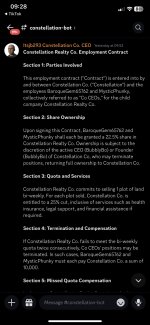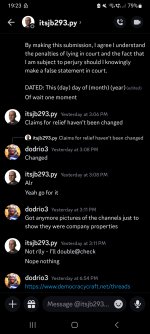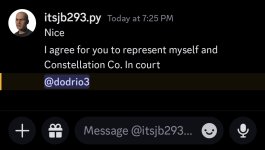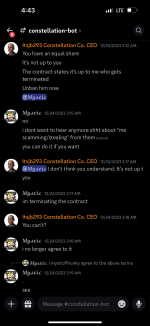dodrio3
Citizen
Supporter
Aventura Resident
Grave Digger
Change Maker
Popular in the Polls
Statesman
Dodrio3
Attorney
- Joined
- May 15, 2021
- Messages
- 415
- Thread Author
- #1
IN THE FEDERAL COURT OF THE COMMONWEALTH OF REDMONT
CIVIL ACTION
BubblyBo (dodrio3 Representing)
Plaintiff
vs.
MysticPhunky
Defendant
COMPLAINT
The Plaintiff complains against the Defendant as follows: On the 23/12/2023, The Defendant entered a contract with the Plaintiff where they were set the role of selling properties. Three properties were bought by to Defendant using company funds- r-066, r-099, and r-075. The Defendant then quit and never transferred the properties back.
WRITTEN STATEMENT FROM THE PLAINTIFF
I. PARTIES
1. BubblyBo - Plaintiff
2. MysticPhunky - Defendant
3. Constellation Co. - Company
II. FACTS
1. The Defendant signed an employment contract with the company Constellation Co. on the 23/12/2023.
2. The Defendant bought properties of r-066, r-099, and r-075 with company funds to sell for the company
3. On the 24/12/2023, the Defendant quit their job at Constellation Co.
4. The Defendant never gave the residential plots back to Constellation Co. after leaving the position.
III. CLAIMS FOR RELIEF
1. The Defendant bought properties on the Plaintiff to sell them on their behalf and then took them and left.
2. The Defendant tricked the Plaintiff into giving them properties and then left the next day.
IV. PRAYER FOR RELIEF
1. r-066, r-099, r-075 to be returned to BubblyBo.
2. $45,000 in punitive damages for the theft of the plots ($15,000 per plot).
3. $15,000 in loss of profits due to the plots not being able to be sold as soon as possible ($5,000 per property).
4. $10,000 in loss of enjoyment in Redmont due to being embezzled by the Defendant.
5. $14,000 in legal fees paid to dodrio3 (20% of the overall case value).
(Attach evidence and a list of witnesses at the bottom if applicable)
By making this submission, I agree I understand the penalties of lying in court and the fact that I am subject to perjury should I knowingly make a false statement in court.
DATED: This 29 day of 12 2023
CIVIL ACTION
BubblyBo (dodrio3 Representing)
Plaintiff
vs.
MysticPhunky
Defendant
COMPLAINT
The Plaintiff complains against the Defendant as follows: On the 23/12/2023, The Defendant entered a contract with the Plaintiff where they were set the role of selling properties. Three properties were bought by to Defendant using company funds- r-066, r-099, and r-075. The Defendant then quit and never transferred the properties back.
WRITTEN STATEMENT FROM THE PLAINTIFF
I. PARTIES
1. BubblyBo - Plaintiff
2. MysticPhunky - Defendant
3. Constellation Co. - Company
II. FACTS
1. The Defendant signed an employment contract with the company Constellation Co. on the 23/12/2023.
2. The Defendant bought properties of r-066, r-099, and r-075 with company funds to sell for the company
3. On the 24/12/2023, the Defendant quit their job at Constellation Co.
4. The Defendant never gave the residential plots back to Constellation Co. after leaving the position.
III. CLAIMS FOR RELIEF
1. The Defendant bought properties on the Plaintiff to sell them on their behalf and then took them and left.
2. The Defendant tricked the Plaintiff into giving them properties and then left the next day.
IV. PRAYER FOR RELIEF
1. r-066, r-099, r-075 to be returned to BubblyBo.
2. $45,000 in punitive damages for the theft of the plots ($15,000 per plot).
3. $15,000 in loss of profits due to the plots not being able to be sold as soon as possible ($5,000 per property).
4. $10,000 in loss of enjoyment in Redmont due to being embezzled by the Defendant.
5. $14,000 in legal fees paid to dodrio3 (20% of the overall case value).
(Attach evidence and a list of witnesses at the bottom if applicable)
By making this submission, I agree I understand the penalties of lying in court and the fact that I am subject to perjury should I knowingly make a false statement in court.
DATED: This 29 day of 12 2023












